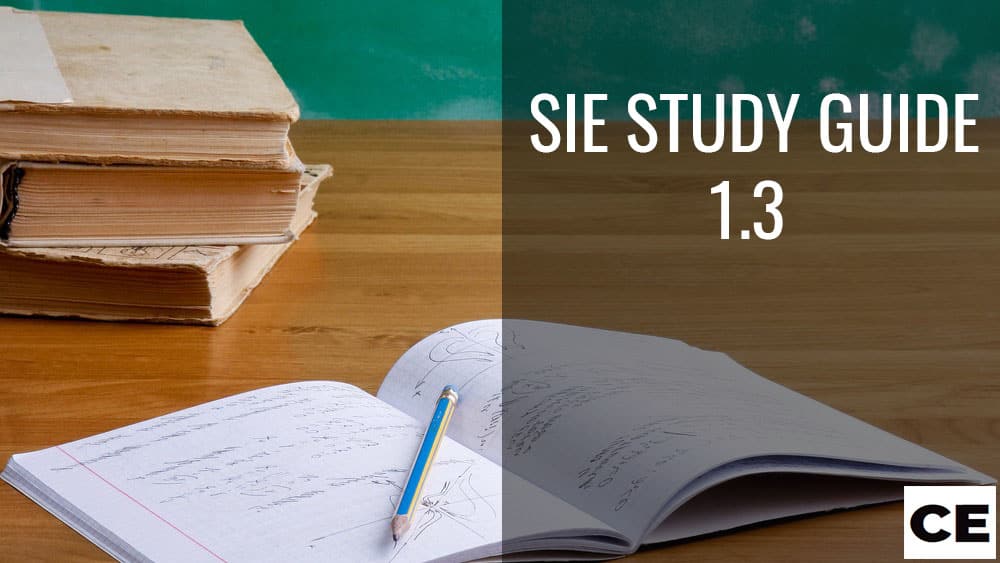SIE Study Guide Navigation
- SIE Study Guide Home
- 1.1 Regulatory organizations, establishments and participants in the capital market
- 1.2 Structure of capital markets
- 1.3 Understanding economic factors
- 1.4 Types of security offerings
- 2.1 Securities products in capital markets
- 2.2 Various types of investment risk
- 3.1 Settlement, trading, and corporate actions
- 3.2 Compliance considerations and customer accounts
- 3.3 Prohibited activities
- 4.1 Associated persons SRO regulatory requirements
- 4.2 Reportable events and employee conduct
In this section, we look at several prohibited activities, most notable, manipulation of the market and insider trading.
3.3.1 Manipulation of the Market
There are thousands of companies that list shares on stock markets around the world.
As we know, the prices for these shares are calculated through the concept of supply and demand.
Prices fluctuate, that’s a natural occurrence in trading.
But every now and again, stock prices can be artificially influenced so that someone gains significantly from the changes.
Of course, this is a totally illegal process and it’s known as market manipulation.
There are many ways in which the market can be manipulated.
Let’s look at some of them now.
Market rumors
The price of stocks is easily manipulated up or down through the spread of market rumors.
Those working in the industry may not spread any false information about stocks for example and certainly cannot start market rumors.
But market rumors don’t only work when those in the industry.
For example, a fraudster could try to influence market prices by spreading misleading information about certain stocks.
And in the age of social media and quickfire communication, this is even easier to do than it was 20 years ago.
It’s the perfect place for fraudsters to start malicious rumors that will benefit someone down the line and they can do so while anonymously hiding behind a social media handle too.
For those who aren’t wary, fraudsters can also try to impersonate sources of market information.
If investors aren’t paying attention, they might just be caught up in the rumor.
Pump and dump schemes
This is often a typical way in which markets are manipulated.
When using a pump and dump scheme, the price of an owned stock is quickly inflated or pumped and later quickly sold once a higher price is reached.
Again, this inflation is usually achieved through rumors, for example, some form of positive information regarding that particular stock that gets investors excited.
Because of these positive rumors, the shares become very popular, leading other investors to buy them.
This only pushes up their price.
Those who start these rumors first make sure that they have purchased plenty of the stock at the initial price and then dump it on the open market when it gets to higher levels.
In doing so, they make a tidy profit and the share prices will drop significantly costing other investors who bought the shares based on the rumors to lose money.
Front runningA Prep Course
Front running sees a broker buying stock for his own account before placing that of a client, knowing full well that will result in a significant price movement.
For example, a broker is instructed to buy a million shares in a particular company which will see the share price move up.
Before he does that, however, he purchases 10,000 shares for himself knowing that they will increase in value when he puts the bigger transaction through later.
Churning or excessive trading
Churning is the act of excessive trading on a customer’s account.
This is done to generate extra commissions rather than focusing on making the right kinds of (and fewer) investments that are in the best interests and investment goals of that customer.
This is a blatant abuse of fiduciary responsibility.
Regulatory bodies – the SEC in this case – have put methods in place to prevent churning.
This includes having the member firm’s principal review all accounts from time to time.
This is particularly important when an investment advisor or the registered representative handling the account has discretionary authority on it and can trade without the go-ahead of the client.
Marking the close and marking the open
This sees investment advisors entering trades before or at the close of the trading day as a way to influence the reported price.
- Marking the open: This sees investment advisors falsely reporting trades that haven’t happened as well as entering trades before the opening of a stock exchange.
- Marking the close: The same scenario as with marking the open, except this takes place near the close of the trading day on the stock exchange.
Freeriding
Freeriding describes the process of buying and selling securities quickly before having to pay for the initial purchase.
This is not allowed in either margin or cash accounts and those who take part in freeriding activities could see their trading accounts frozen for a period of 90 days.
Matched orders
With matched orders, the selling of shares occurs between one party and another with an agreement in place that it will be repurchased at the same price and usually on the same day.
The main idea behind this is to make share volume (activity on the stock) seem a lot more active than it is in reality.
This activity is also known as “painting the tape”.
Backing away
This is when the bid and ask prices quoted on a certain security are not honored by the market maker who showed interest in buying them.
3.3.2 Insider Trading
There are numerous obligations that those working in the securities industry have, not only towards their clients but to the capital market system as well.
We’ve covered the various ways in which the market can be manipulated, but in this section, we look specifically at insider trading.
Those who take part in this practice certainly are violating their obligations.
But what is insider trading?
Simply put, it’s when someone privy to confidential information that could affect a stock price significantly uses that information to trade in stock for their own personal gain.
So a certain company might have a project under wraps that, when announced, will greatly influence their stock price and push it up significantly.
Insider trading would see someone privy to that information purchasing that stock at its current price and gaining a massive advantage when the prices rise when the project is announced.
The information described above is known as material non-public information.
It can greatly influence the share price, as we have mentioned, but it can affect investment decisions too.
So what are examples of non-public information?
Well, there are quite a few and you can immediately see how these decisions would play a role in investment decisions and stock prices.
- New patent developments
- Defaults on existing loans
- A company facing significant legal proceedings
- A company acquired by or acquiring another company
- A soon-to-be merger between two companies
Anyone with knowledge of these types of non-public information who then uses it and trades in that companies security is violating various federal statutes, FINRA rules, and insider trading rules as set out by the SEC.
Those violations bring with them severe penalties.
For individuals who break insider trader rules, penalty options include fines and even imprisonment.
For example, they may face up to 30 years of jail time and/or receive a $5 million fine.
For corporations that practice insider trading, fines can reach up to $25 million.
Insider trading fines changed significantly in the late 1980s.
Up until that point, those who practiced insider trading would only be fined up to $5,000!
To put a stop to the practice, broker-dealers and other investment companies must:
- Have supervisory procedures that forbid the practice
- Draw up policies that limit the passing of non-public information between staff and various departments
This helps to keep the sensitive information with only the individuals and departments who need to know it and establishes a protective information barrier.
3.3.3 Additional Prohibited Activities
Let’s look at other prohibited activities that are important to understand.
Initial public offerings and the purchase thereof
New issues of securities or initial public offerings (IPOs) as they are known cannot be purchased by registered representatives.
New issues of securities cannot be sold either to their affiliates or other broker-dealers.
Using fraudulent, deceptive, or manipulative means
Any purchase, sale, or other transaction of securities that are either fraudulent, manipulative, or deceptive is not allowed by member firms.
Using customers’ funds or securities in an improper manner
Using customers’ funds or securities improperly is forbidden.
This covers many different things, from theft to trading on their accounts without receiving discretionary orders to do so.
Other examples of improper usage of a customer’s funds or securities include: Borrowing from or lending to a customer, sharing customer accounts, and the financial exploitation of seniors.
Borrowing: For the most part, associated persons or member firms dealing with a customer can never borrow money from them to purchase securities. They may never borrow money from a customer either. There are exceptions to this, but there must be written policies in place that specifically cover how borrowing and lending will work.
These policies must meet one of these stipulations.
- They related to the associated person (an immediate family member only, however)
- It is a borrowing or lending financial institution
- They are working at the same member firm as the associated person
- Together with the associated person, they have either a business or personal relationship outside of the member firm
Sharing in customer accounts: For the most part, associated persons or member firms are not allowed to share in the gains or losses of their customers, either directly or indirectly.
There are some conditions, however, where this is allowed by authorities:
- The member firm provides prior written authorization to the associated person
- The customer proves prior written authorization to the associated person
- The customer’s gains/losses and the shares of the member firm or associated person in them are directly proportional to the financial contributions they’ve made
Exploiting seniors financially: When looking at the top prioritized investor groups by FINRA, seniors are right up there.
That’s because it’s often this group of investors where financial exploitation is rife.
FINRA classifies seniors into two groups:
- Those who are over the age of 65 and considered a natural person
- Those over the age of 18 who have a physical or mental impairment and are considered a natural person
Temporary holds can be placed on any “specified adult” account if it’s believed that they have or could be financially exploited as per FINRA rules.
That hold allows the member firm to investigate further.
Activities of unregistered persons
There are registration and licensing requirements that are subject to persons providing and performing investment banking functions.
This includes supervision and solicitation of securities, for example.
- Unregistered persons may not be paid commissions, discounts, concessions, fees, or compensation by a member firm
- Discussing investment products/services, soliciting new customers, soliciting orders, or pre-qualifying customers as well as other tasks may not be carried out by an unregistered person.
If unregistered persons or companies provide services like this, there are repercussions.
Withholding or falsifying documents Course
No registered representative can create forms that are blank templates with signatures already on them.
This is known as a signature of convenience.
Also, any regulatory requests received as a registered representative or company must be responded to in a timely manner.
Maintenance of books and records
Accurate books and records must be kept at all times by registered representatives and the firms they work for.
It’s a serious violation to falsify any of these records.
It’s important to note that there are strict regulations in place as to how records and books should be kept.
They can be stored in paper form, electronic media, or as micrographs and kept for a particular period as stated in the procedures and policies of the firm holding them.
Normally, that’s around a period of six years.
Providing unsuitable recommendations
Disciplinary action can be taken against registered representatives who make recommendations that are not in line with the investment goals of their clients.
Making recommendations that do not match the client’s investment goals and needs is unsuitable and can lead to disciplinary action.
A registered representative operating under a fiduciary obligation does so with the client’s best interests at heart.
Commingling
This is the act of using taking a client’s assets and mixing them with either those of the firm or the registered representative.
At all times, the assets of a client, their money, and securities must be kept segregated from those of the registered representative or the firm they work for.
Any criminal behavior
It’s not only illegal to steal or try to embezzle clients, it’s unethical too.
Not only can it lead to jail time, but the loss of a career in the securities industry.









